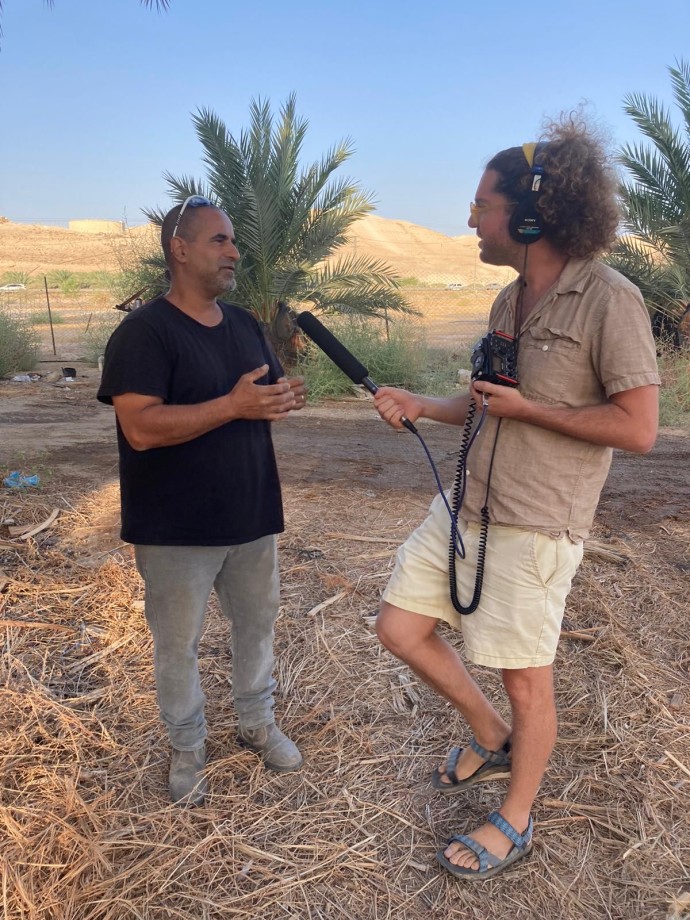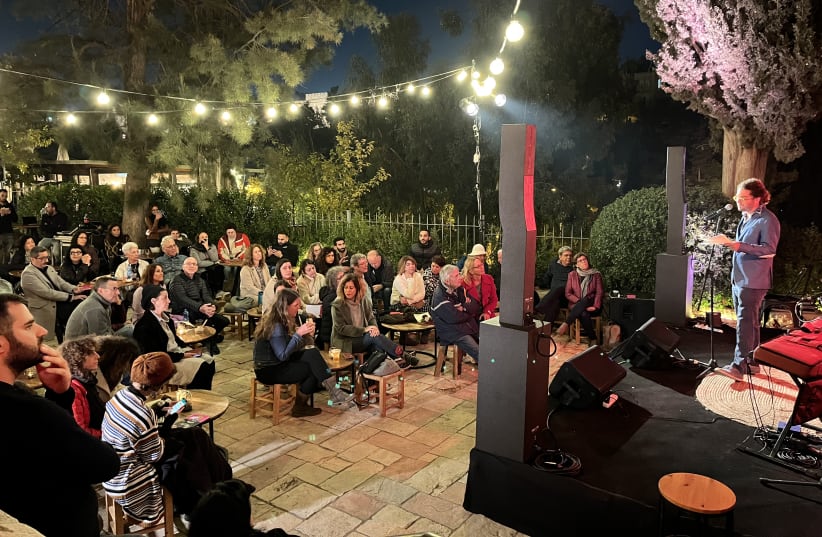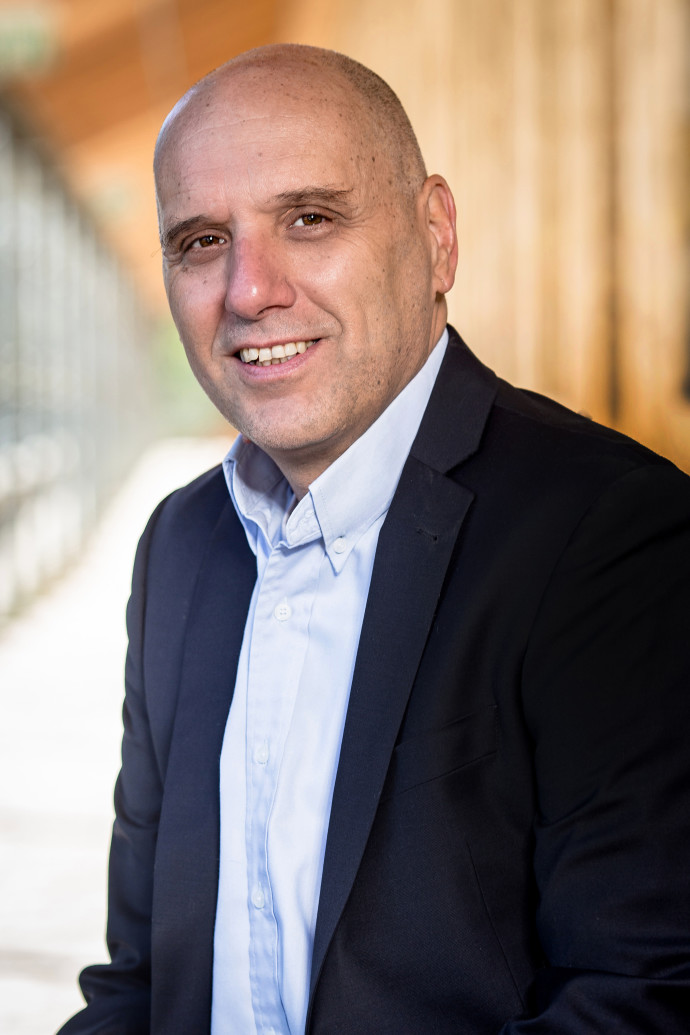‘They are a group of creative, productive young people who are innovating,” says Shai Doron. “They are what we are looking for in the young generation of Jerusalem.”
Who is the subject of Doron’s affection? They are not musicians, farmers, professors or scientists. They are storytellers – the producers of the popular Israel Story podcast; and sharing the stories of Israel and Jerusalem is vital for the city’s past, present and future.
During a recent visit to the offices of the Jerusalem Foundation, this writer sat with Doron, president of the foundation, and Mishy Harman, co-founder, CEO and host of the Israel Story podcast, to learn about the joint interests of the two organizations and their current partnership, which began in May 2021.

Harman, casually dressed in sneakers and jeans, with a scraggly beard and a ponytail, has a decidedly informal air about him, belying his university studies at Harvard, Cambridge and the Hebrew University of Jerusalem.
He was inspired to create the podcast after listening to hundreds of episodes of This American Life, the popular NPR podcast, while driving through the United States in the summer of 2010, when, during his estimation, he drove through 43 of the 50 US states.
After returning to Israel, Harman, together with two friends, began production of the Hebrew-language version of the podcast, known as Sipur Yisraeli (Israel Story), which was broadcast on Army Radio for several years.
In 2014, Harman and his associates began the production of an English-language version of the podcast – Israel Story – which has become the most listened-to Jewish and Israeli podcast in the world, reaching millions of listeners in 190 countries. Israel Story, which issues podcasts biweekly, recently began its seventh season.
The quirky, award-winning podcast tells unpredictable and unusual tales about the lives of ordinary Israelis.Scanning the list of topics discussed in the podcast’s six years, one finds an eclectic cross section of subjects, including what happens when religious couples no longer see eye to eye on matters of faith; the history and importance of the famous song “Jerusalem of Gold”; the story of the Jews of Iraq; a day at the Jerusalem International YMCA; and a visit to the inhabitants of 48 Herzl Street, an address that appears in no fewer than 54 locations throughout Israel.
'Storytelling is a way to connect Jerusalemites’
Israel Story tells the stories of the real Israel, collecting a range of tales that celebrate the diversity of people, communities and what they term “Israeliness.”
In May 2021, after years of working in coffee shops, libraries and his home, Harman came to the conclusion that Israel Story needed physical office space. He reached out to the Jerusalem Foundation, and Doron, recognizing the benefits of hosting Israel Story, immediately offered the podcast team space in the foundation’s offices.
Doron explains that housing the team within the foundation was an important means to cement two of the organization’s cornerstones for developing the city – creative culture and future leadership. “I have no doubt that Mishy and his group are the future young leadership of the civil society of Jerusalem. They will lead Jerusalem in the future.”
Harman sees an association between telling Israel’s stories and the activities of the Jerusalem Foundation.“Storytelling is a way to connect Jerusalemites,” says Harman. “We live in tiny social bubbles, and the Jerusalem Foundation has endless activities in every sphere – sports, culture, arts and education – that bring people together; and layering on top of that, this project of storytelling was a very clear connection.”
Every street and stone in Jerusalem tells its unique story, and by inviting the Israel Story team to the Jerusalem Foundation, Doron envisions that “Jerusalem can become the capital of world storytelling.”
The task of telling the stories of Israel and Jerusalem to the world became easier when the foundation, through its Keren Lee – Social Impact Fund, provided key funding to help build a state-of-the-art podcasting studio in the basement of the foundation’s headquarters.
Doron explains that the creators of Israel Story not only use the studio to record their podcast but also rent out the studio at subsidized rates to other not-for-profit organizations in Jerusalem.
“It is an economic model by which they generate independent income,” he says. In addition, Israel Story provides the studio to local community organizations and teaches podcasting to high school students. Other organizations’ usage of the studio brings in revenue to Israel Story, which is significant.
Harmon explains that one of the buzzwords in the world of philanthropy today is “sustainability.” “People don’t want to support organizations that rely entirely on philanthropic dollars. Funders today – in Israel and around the world – want to see that you can create some sort of revenue stream.”
While the scope and nature of their organizations are different in many ways, the Jerusalem Foundation and Israel Story, says Harman, are aligned in one important area – Jerusalem and its people.
“We both understand that the real wealth of the city and its future are its people,” he says. “The Jerusalem
Foundation, through countless other projects, and Israel Story, through storytelling, can shine a light on a city that is complicated.”
Drawing from his own activities, Harman adds, “I run now, and it’s impossible to run more than a few kilometers in Jerusalem without shifting and zigzagging between completely different realities.
“That is what is ultimately the strength of the city, that makes it a place that is so vibrant and interesting. There are other cosmopolitan cities in the world, but Jerusalem is like no other place. Israel Story, through its storytelling, and the Jerusalem Foundation, through its investment in leaders and people, are able to realize that that, ultimately, is Jerusalem’s message.”
Both Harman and Doron point out that an unusual aspect of the relationship between the two organizations is the level of trust that exists and the independence that Israel Story has.
“We have no editorial control,” says Doron. “I believe in their creativity. We cannot become involved in the content.”While Doron has given Israel Story the freedom to tell the story of Israel and its citizens as it sees fit, he requested that the organization add programming centered on Jerusalem.
Harman recalled that in the early days of the podcast, the team members would invite people to his apartment in Jerusalem’s Nahlaot neighborhood to tell stories, in order to find interesting material for their podcasts.There was magic in those evenings,” recalls Harman with a smile. “We had young and old, capitalists and socialists.”
Harman suggested to Doron that they could revive and renew the live storytelling events in Jerusalem that gave them their start. The Israel Story team started producing them under the name of “Sipur Yerushalmi” (Jerusalem Story) and recording them live. In 2022, they held 16 storytelling events in Jerusalem. Most of them were in Hebrew, but they had one in Arabic and one in English.
In 2023, Israel Story will hold between 20 and 24 storytelling evenings, including an event in French and one in Yiddish for haredi women. The storytelling events offer free admission, food and drink and, most importantly, entertaining stories told by members of the audience.
“There is something about stories – more than music – that allows a wide range of people to be attracted to the same events,” says Harman. “You have students from Bezalel sitting next to haredim, sitting next to a man from a synagogue in Pisgat Ze’ev – there’s a wide variety of people who attend.”
The Process? Harman explains that after they announce an event and its theme, people submit story ideas based on the theme. Israel Story producers select the best ideas and train the amateur storytellers to tell their stories in public before an audience of between 100 and 200 people. Sipur Yerushalmi events feature between six and eight stories, and last between one and a half to two hours.
“It’s tremendous because it’s a throwback to another reality,” says Harman. “People are not looking at their phones. They are there to hear stories. On these evenings, you encounter beautiful Jerusalem. There’s a tremendous variety of people living here.”
He adds that the stories expand the horizons of the listeners. “When else are you going to listen to a story from someone who may have completely different political opinions than you, lives in a different part of Jerusalem, and has a completely different reality? These are the places where we come together and see that we are not bounded by the limitations of our own biography.”
Harman and his team are recording the live storytelling events and plan to release them as a collection of podcasts at a future date.
The 15-member staff of Israel Story assembles most days in its office to discuss, brainstorm and come up with ideas for podcasts. The glass wall is covered with ideas and projects scribbled in magic marker, and photos for an upcoming project line the back wall. The place is buzzing with activity and promise, which is what Doron likes.
Another project in development through Israel Story, through the Jerusalem Foundation’s Innovation Fund, is a storytelling app that will allow users to record audio stories and “attach” them to physical locations on a map.
Visitors to Jerusalem will then be able to filter content according to social networks, areas of interest, themes, and more, and experience the city through the tales of its residents.
“The city becomes a mosaic of stories,” explains Harman. “Especially in a city like Jerusalem, which is so storied, the deep premise is the democratization of the city. The story of Jerusalem is the collective sum of all our experiences.”
Harman and his staff are full of ideas and energy. The partnership with the Jerusalem Foundation, he says, “allows us to dream, and dream big.” He has ideas for creating children’s podcasts, developing podcasts timed to match travel times on the Jerusalem light rail, and is planning a special series of podcasts around Israel’s 75th anniversary this May.
Podcasts, by definition, eliminate the visual element, says Harman, allowing listeners to suspend judgment that they might otherwise render from the speaker’s visual appearance, and to simply listen to what people are saying.Harman says, “A person is a person is a person – no matter what. We can only learn and grow as individuals and as a society if we listen to each other.”

